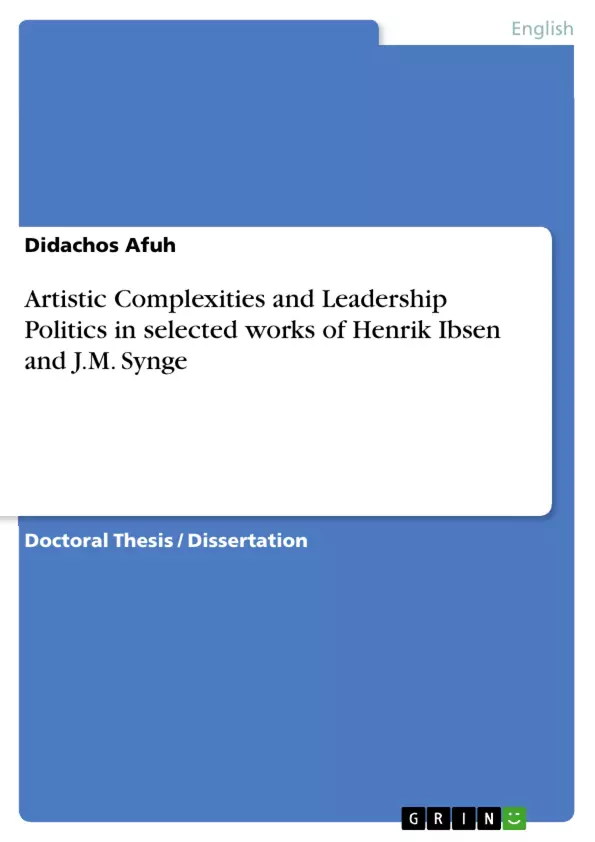This work sets out to show how Ibsen and Synge adopt an unconventional style in presenting conflicting and contradictory political alternatives. The work deals with the controversy that characterised the writings of the playwrights both in their subject matter and in their style. Specifically, their ideas on politics and gender relations challenged their contemporaries and still remain the subject of scholarship today. This study thus defends the view that far from avoiding the burning issues of their days, the playwrights repeatedly challenged the central political debates of their respective societies. The work therefore discusses the political climate of Europe, and more particularly, the socio-political climate of Ibsen’s Norway (between 1827 and 1913) and Synge’s native Ireland during the struggle for home rule. Against this backdrop, the work shows how Ibsen and Synge responded to three political questions: the relationship between aristocratic and colonial leaderships on the one hand, and the democratic form on the other hand; between public opinion (national culture) and individual freewill; and between the law and collective progress.
Inhaltsverzeichnis (Table of Contents)
- Dedication
- Acknowledgments
- Abstract
- Chapter 1: Introduction
- The Problem Statement
- Research Questions
- Objectives of the Study
- Theoretical Framework
- Methodology
- Significance of the Study
- Scope and Limitations
- Chapter 2: Literary Context
- Ibsen and the Social and Political Context of Norway
- Synge and the Social and Political Context of Ireland
- Chapter 3: Leadership Politics and the Individual in Ibsen and Synge
- The Tyranny of the Majority
- The Individual and the Collective
- Chapter 4: Artistic Complexities and the Representation of Leadership Politics
- Symbolism
- Irony
- Dramatic Patterns
- The Retrospective Technique
- Chapter 5: Conclusion
Zielsetzung und Themenschwerpunkte (Objectives and Key Themes)
This PhD thesis explores the unconventional style of Henrik Ibsen and J.M. Synge in portraying conflicting political ideologies. The study investigates the contentious nature of their writing, both in terms of subject matter and artistic style. It delves into their challenges to conventional political and gender norms of their time and how these themes continue to resonate with contemporary scholarship. The thesis aims to demonstrate that Ibsen and Synge, far from shying away from the pressing issues of their era, directly confronted the central political debates of their respective societies.
- Artistic Complexity and its Role in Depicting Conflicting Political Alternatives
- The Intersection of Political and Social Issues in the Works of Ibsen and Synge
- The Relationship between Leadership Politics and Individual Freedom in the Plays
- The Use of Symbolism, Irony, and Dramatic Patterns to Highlight Artistic Complexity
- The Influence of New Historicism and Lacanian Psychoanalysis on the Analysis
Zusammenfassung der Kapitel (Chapter Summaries)
Chapter 1, the introduction, presents the research problem, objectives, theoretical framework, methodology, and significance of the study. It lays the foundation for the analysis by outlining the core arguments and guiding the reader through the structure of the thesis.
Chapter 2 delves into the literary context of Ibsen and Synge, examining the social and political landscapes of Norway and Ireland, respectively. It contextualizes the writers' works within the specific historical, cultural, and political environments that shaped their artistic expressions.
Chapter 3 explores the central theme of leadership politics and its impact on individuals in the works of Ibsen and Synge. It analyzes how the playwrights portray the tension between individual freedom and the demands of societal norms and political structures.
Chapter 4 examines the artistic complexities employed by Ibsen and Synge in their representations of leadership politics. It analyzes how the playwrights utilize symbolism, irony, dramatic patterns, and the retrospective technique to create multifaceted and thought-provoking narratives.
Schlüsselwörter (Keywords)
The main keywords and focus topics of this thesis include Henrik Ibsen, J.M. Synge, leadership politics, artistic complexity, symbolism, irony, dramatic patterns, retrospective technique, New Historicism, Lacanian psychoanalysis, Norway, Ireland, social and political context, individual freedom, societal norms, power dynamics, and controversial themes.
- Quote paper
- Didachos Afuh (Author), 2016, Artistic Complexities and Leadership Politics in selected works of Henrik Ibsen and J.M. Synge, Munich, GRIN Verlag, https://www.grin.com/document/1488107



